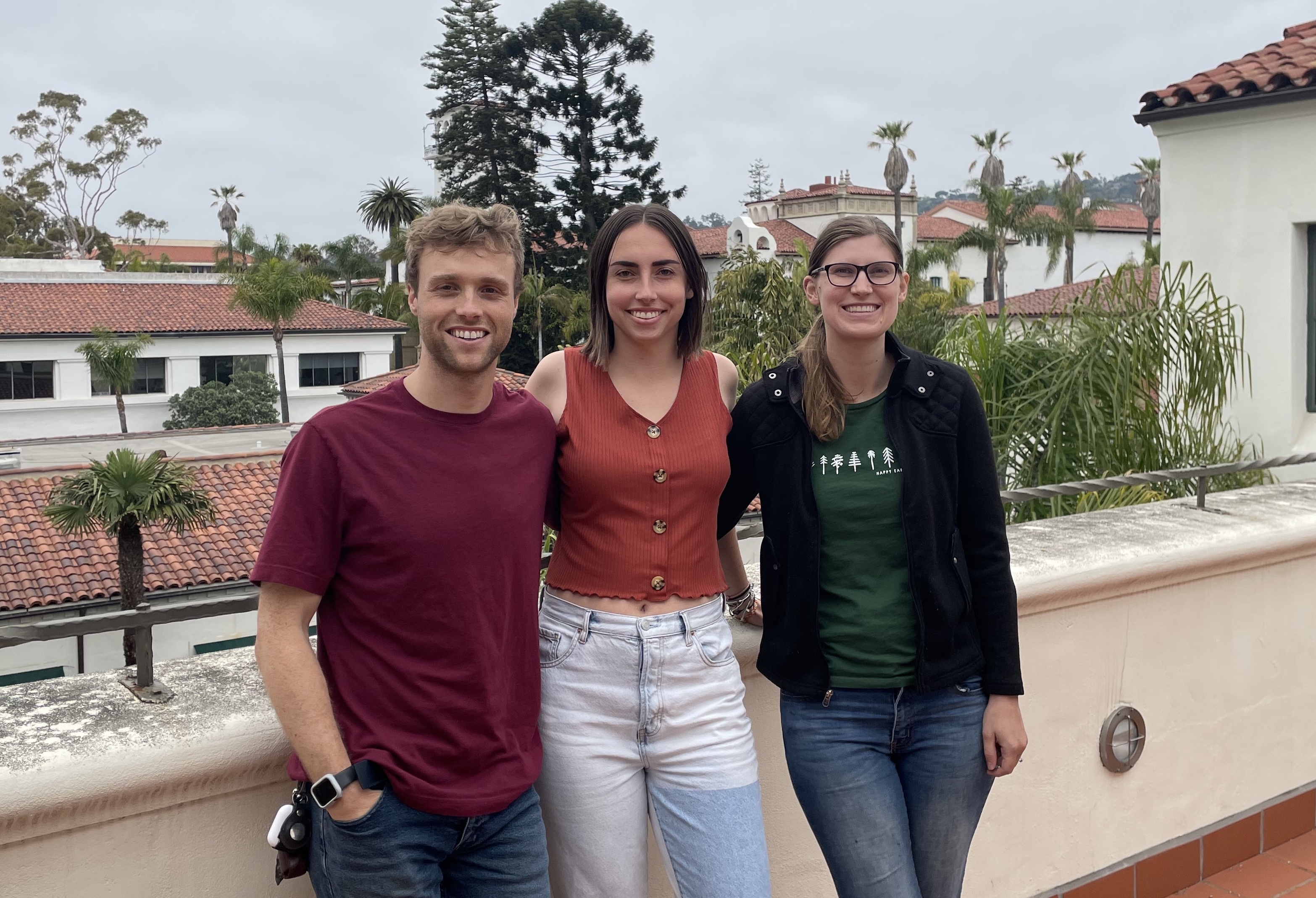Overview
Getting to know the 2023 Fellows
Mon, May 29, 2023
In 2023, the Ocean Health Index Global Fellows program has welcomed three fresh Data Science and Communication Fellows to its ranks. The selected trio all hail from the newly instituted Masters of Environmental Data Science (MEDS) program. This course is a collaborative effort between the Bren School of Environmental Science and Management, and the National Center for Ecological Analysis and Synthesis (NCEAS).
In this blogpost, we ask the incoming fellows questions to better understand their motivations while getting to know them.

Question 1
Where are you from?
Adelaide: I was born in Santa Cruz, but grew up in Kelseyville, a small town in Northern California. Since graduating from undergrad at UC Davis, I’ve explored and lived in many places along the West Coast working as a biological field technician.
Erika: I’ve lived on the Central Coast my whole life! After graduating high school, I attended UCSB for my undergraduate education and my Master’s.
Carlo: I grew up in the central valley town of Modesto, California. Modesto’s motto is “Water, Wealth, Contentment, Health.” I moved to Santa Cruz for college and lived and worked there for 7 years before moving to Santa Barbara to work at the university and then go to school for my graduate degree.
Question 2
What are some of your interests, personally and professionally?
Adelaide: I’m passionate about the environment and wildlife, both in my personal life and career. I spend my free time birding, hiking, and caring for my growing pet family. Professionally I’m interested in utilizing data science to improve conservation efforts in fisheries and aquatic ecology.
Erika: Professionally, I primarily enjoy learning about how computational methods can intersect with a wide variety of fields, especially as they pertain to urban-centered socio-environmental topics. However, I also love exploring new topics and learning about what other people are passionate about so that I can share in their passion. Personally, I love going to the movies and trying new foods and activities.
Carlo: I am professionally interested in accelerating our ability to live within the earth’s carrying capacity. As far as I can tell, using computer technology to measure and manage humans and their relationship with the environment is the best way to accomplish this. As an added bonus, sometimes it can be really fun! I especially like working with people who are willing to teach me new things and build friendships.
I am personally interested in exercise and recreation. When I was young, I had a number orthopedic health problems that left me with a fear of hurting myself. To ward of the specter of injury I’ve collected a catalog of hobbies so that I can alternate between them to prevent overuse. At the time of writing my wife and I: climb, trail run, normal run, backpack, swim, surf, play pickleball, do yoga, down-hill ski, back-country ski, and mountaineer. We have also been known to roller blade, but we just call it “blading.”
Question 3
What drew you to the Ocean Health Index, and what are you excited to learn?
Adelaide: I’ve worked primarily in fisheries monitoring, where the focus was typically on a few endangered species in a localized area. Working with the Ocean Health Index struck me as a great way to broaden my experience by contributing to a project that instead takes a composite indicator approach to monitoring, and synthesizes many sources of data. I’m also interested in data management and reproducibility, and I’m looking forward to learning more about the reproducible workflow OHI uses to efficiently calculate global scores each year.
Erika: Previously interning at the Arctic Data Center at NCEAS, I had heard about the Ocean Health Index and thought it was a really intriguing synthesis project, particularly because of its emphasis on reproducibility. Growing up along the coast, I’ve also seen a lot of tourism-centered processes and I have always been curious about further exploring humans’ relationship with the ocean in a quantitative way. I am excited to learn more about what benefits humans derive from the ocean and how marine ecosystems can thrive while also sustaining humans.
Carlo: I learned about the Ocean Health Index from a number of my instructors at UC Santa Barbara during my graduate studies. They pitched OHI one of the ways NCEAS pioneered open environmental data science. That is what I am here for. I am here to learn how to work as part of a team to tackle a thorny global scale environmental problem and create value for the communities that rely on the OHI scores. The OHI fellowship is a chance to receive mentorship at one of the central nodes of the environmental science community. It is a great opportunity and I am extremely grateful and excited to get to work!
Question 4
What is something you have found interesting and want to recommend to others?
Adelaide: I highly recommend rabbits as indoor pets. They are adorable, quiet, and great at composting your leftover veggies!
Erika: One of the most fascinating films I’ve seen in theaters in the past year is The Menu. I feel that it comments on our culture surrounding food experiences in a unique way, and the ending subverted my expectations (very important to me in films), was very clever, and caused the whole message to come together nicely.
Carlo: Every yoga studio in Santa Barbara has a new member deal. The yoga studio density in Santa Barbara is so high that you can hop from studio to studio for an entire year as you try each one out for a discounted price. The yoga itself is great and this recommendation is worth trying out just for that, but the best part is getting to see all the different yoga subcultures and meeting all the staff and clientele. This and that corn and yams can be microwaved and eaten as a great midday snack are my two recently learned somethings.